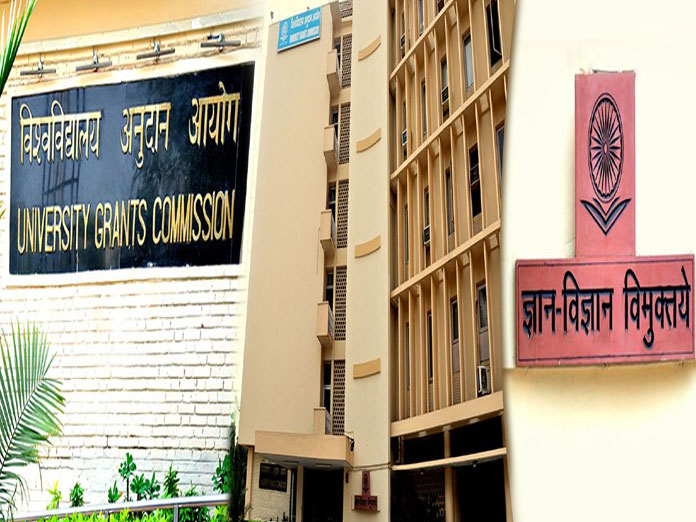UGC syllabus for teaching Indian languages questioned

Questions are arising over the University Grants Commission UGC syllabus prescribed in teaching different Indian languages Telugu, Tamil, Kannada, Bengali, Manipuri and AssameseAccording to sources, the UGCs instructional template for implementation of Choicebased Credit System CBCS for Bachelor of Arts in Telugu, Tamil, Kannada, Bengali, Assamese, Sindhi, Manipuri and Odia has a unique pap
Hyderabad: Questions are arising over the University Grants Commission (UGC) syllabus prescribed in teaching different Indian languages Telugu, Tamil, Kannada, Bengali, Manipuri and Assamese/According to sources, the UGCs instructional template for implementation of Choice-based Credit System (CBCS) for Bachelor of Arts in Telugu, Tamil, Kannada, Bengali, Assamese, Sindhi, Manipuri and Odia has a unique paper on the "Cultural Behaviour" of people. Study of this paper gives students six credits in the academic programme.
The aim of introducing this paper is to acquaint the students with the meaning of culture and various manifestations of culture such as social customs, clan traditions, family customs, rituals, festivals, beliefs on omen, etc.The outcome of the studying this paper, the UGC claimed, is meant to enable the students to understand the social, religious and cultural significance of the behavioural patterns exhibited by the people in the society, based on cultural beliefs.
Further, the study will enable the students to know the evolution of culture and to understand the various cultural issues. In regard to Telugu-speaking people, the syllabus prescribed has aimed to teach the students the cultural bearings of the Telugu- speaking States of Andhra Pradesh and Telangana, that share a common language, but of different geographical, historical and socio-economic backgrounds.
Also, the diversity of customs and traditions, festivals, food habits, the local historic fairs and celebrations, clothing, and more significantly, the attitudes and behaviour of people are to be studied to understand the regional aspirations and political formations, it said. The topics selected to achieve the above outcomes, students in Telangana and Andhra Pradesh will be taught:1.The cultural history of Coastal Andhra, Telangana and Rayalaseema,2.Politics of dominance and co-option, 3.Political aspirations: class dynamics and agrarian struggles and 4.Caste, Class and Social articulation: different regional trajectories.
Besides, it will also have a chapter on the 'Cultural dichotomy and the creation of Telangana' it added.Speaking to The Hans India, a senior professor from the Potti Sriramulu Telugu University, Hyderabad, said, "festivals, traditions, customs etc are studied from the viewpoint of literature through a literary work." But, what the UGC prescribing is wrong way of teaching culture which is in line with the methodology of the British Raj days to stereotype people's social, cultural, religious contexts and to stamp them with a specific cultural disposition as a fixed parameter to understand or perceive them, said another Telugu faculty member from Andhra University, Visakhapatnam.
Giving credence to such criticism the UGC syllabus for the same undergraduate course in English, French, Italian and few other foreign languages does not have anything that the students could get an idea about the cultural behaviour patterns of those linguistic communities.Also, students from a few other linguistic communities like Urdu, Sanskrit, Gujarathi, Punjabi and a few others have not prescribed with such a paper on the cultural behavioural patterns.
The themes prescribed to the above language speaking includes certain topics about the underprivileged in their respective societies. But there is nothing which attempts to stereotype the perception of their cultural dispositions and behaviours, the sources said.














